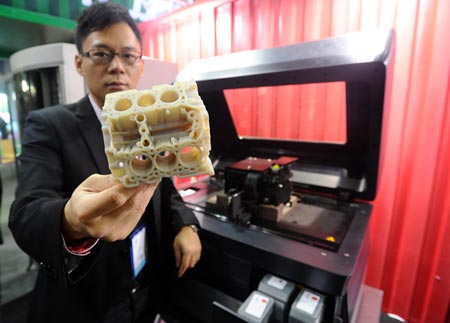 NEWS
NEWS
 NEWS
NEWS
 NEWS
NEWS
![]() Anyone with even the remotest bit of ‘geekiness’ about them will have heard of the 3D printer by now. In case you haven’t, here’s a quick look at the technology and what it’s capable of – in short, 3D printers are like one of those futuristic replicator machines straight out of Star Trek. They take 3D graphic designs and transform them into all kinds of weird and wonderful, real-world objects, including pieces of art, buildings, meat (!) and potentially even bases on the moon.
Anyone with even the remotest bit of ‘geekiness’ about them will have heard of the 3D printer by now. In case you haven’t, here’s a quick look at the technology and what it’s capable of – in short, 3D printers are like one of those futuristic replicator machines straight out of Star Trek. They take 3D graphic designs and transform them into all kinds of weird and wonderful, real-world objects, including pieces of art, buildings, meat (!) and potentially even bases on the moon.
The potential of this technology is truly awesome – so awesome in fact, that by the time it becomes affordable and widely available, it’ll be difficult for us to imagine how life-changing it might be. One of the more obvious predictions is that 3D printing will transform the manufacturing process.
Sooner or later, we’re going to reach a point where it’s possible to print all kinds of consumer products cheaply. Researchers in the UK recently proved it’s possible (although the technique still needs much refinement) to 3D print electronics, bringing us a giant step closer to the day when we might be able to print everything from cell phones and iPods to laptops and Smart TVs, in addition to the usual plastic junk that the technology is (by and large) limited to now
A recent article in the Harvard Business Review points out that China is likely to suffer the most disruption from 3D printers. After all, here we have a nation that has essentially become the world’s factory, churning out everything from our electronic gadgets to more mundane, plastic components for all manner of industries – but all of this could all easily be replaced by 3D printing technology.
Only a brave man would bet against this possibility, but China will probably escape the worst of the fallout. For one thing, not every product lends itself to 3D printing in any case (there will always be clothes, though maybe not bikinis), and its economy is moving at such a pace that before too long it won’t be reliant on manufacturing anyway (and in any case, there’s always its own, massive consumer market to fall back on).
But there’s another factor that few commentators have taken into consideration. What of China’s, how should we put it, ‘lax’ enforcement of intellectual property rules? Fact is, China quite rightly has a reputation for not giving a damn about anyone else’s copyrights or intellectual property rights, with freeloaders and scammers up and down the country copying everything and anything they can get their hands on.
If 3D printing catches on, there’s no reason to believe that China will act any differently in regard to intellectual property, and every reason to believe that the bootleggers will simply switch trades, building up a nice little sideline of fake 3D printed goods. The spectre of fake 3D printing has the potential to harm, and perhaps even destroy, any industry that latches onto the technology thinking it’s more efficient.
Just look at the music industry and how it has suffered due to illegal downloads – now just imagine what would happen if it was possible to download files of 3D printer models for almost any consumer product you wanted? Finally, we would actually have fake copies that are as good as the originals, at less than half the original price!
![]()
The authorities would do their best to clamp down on this in western countries, but would that happen in China? Not likely.
When 3D printing catches on and becomes a viable method of manufacturing gadgets like smartphones and computers, companies like Apple et al will need to tread very carefully indeed. The temptation to switch to 3D printed phones instead of factory made gadgets will be huge, given their corporate greed and the huge savings to be made in labor costs – but such a move could well cost them dearly if someone ever managed to get hold of those all-important iPhone specs.
THANK YOU